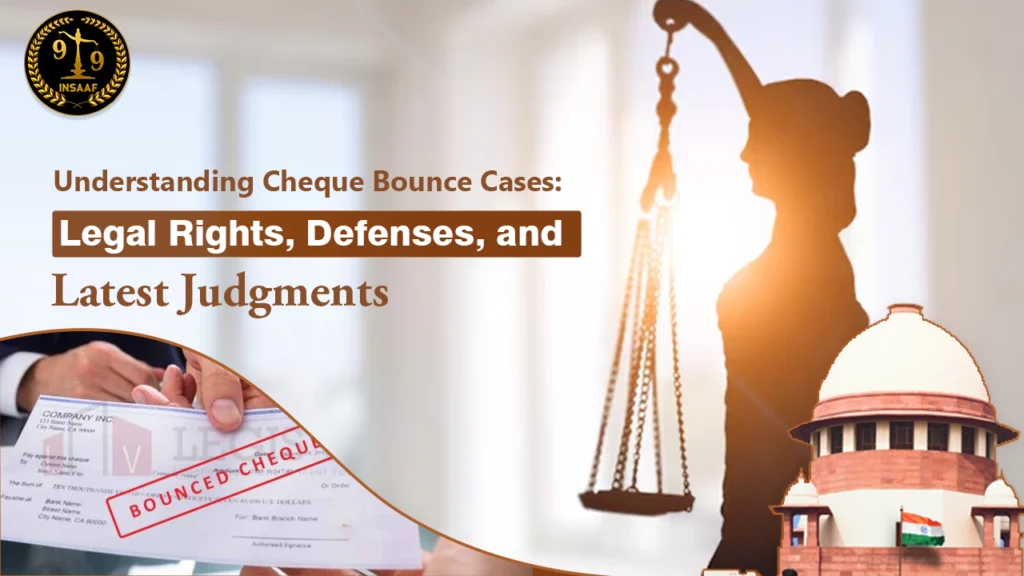

Online Legal Advice from Insaaf99® Online Lawyer Consultation in India


Online Legal Advice from Insaaf99® Online Lawyer Consultation in India

Cheques are undoubtedly one of the most reliable tools of financial transactions in India. However, when such cheque is returned back or "bounced" some severe legal consequences can arise as from Section 138 of the Negotiable Instruments Act, 1881. In this article we will analyze the complexities of bounce check cases, and explore the legal position, reasons, consequences, and cures of this crucial subject.
A cheque bounce takes place when the drawn cheque is presented and the bank being unable to honour the respective cheque. This can be for many reasons including lack of sufficient balance on the account, failure to match the signature, writing over the cheque, or when the account is blocked. While defaulting on a cheque can cause a lot of hitches in the cash flow it does not only make financial sense to default, but it can also attract legal consequences in India.
In India, dishonoring of cheques is dealt with in accordance with Section 138 of the Negotiable Instruments Act of 1881. This section offers a legal relief to the payee of the cheque where the amount in the cheque has not been honored. Cheque bounce is a criminal act which makes the financial transactions more credible.
Legal Notice Requirement: A legal notice must be served by the payee to the drawer within 30 days from the receipt of memo of dishonor by the banker on cheque dishonor.
Timeframe for Payment: Upon provision of the legal notice, the drawer is expected to clear his or her dues within the next 15 days.
Filing of Complaint: Where the drawer has not paid, the payee may proceed to court as a criminal complaint within fifteen days after thirty days.
Insufficient Funds: This is quite often a cause of dishonor.
Mismatch of Signature: The deviation from the original signature can cause the cheque to bounce.
Post-dated Cheques: Presenting a cheque before its date.
Account Issues: Closed or frozen account.
Technical Errors: Overwriting, torn cheque or perhaps bad writing.
The consequences can be quite serious, monetarily and legally for any person who has been undergoing a cheque bounced offense. Under Section 138, the consequences include:
Monetary Penalty: The defaulter may be made to pay a fine which could be equivalent to sums up to double the cheques amount.
Imprisonment: The imprisonment may extend to two years.
Civil Liability: The payee can take legal action to recover the amount of the cheque tendered.
The penalties give an intention of correcting the errant behavior of individuals.
While cheque bounce cases impose strict liabilities, the accused (drawer) can employ these defenses to avoid liability:

The Supreme Court of India has interpreted a crucial role in the context of handling Section 138 regarding the cases of cheque bounce. Here are the highlights of some recent judgments:
1. Effectively, Expediting Proceedings in Cheque Bounce Cases(2022): The Supreme Court of India recently called upon the subordinate courts to clear cheque bounce case with due dispatch while reinforcing the concept of commercial honour. It also recommended the use of video conferencing to enhance trial processes since it will reduce the time taken.
2. Guidelines for Interim Compensation: In a landmark judgment, the Supreme Court enabled the trial courts to order the accused to pay 20% of the cheque amount as a cost during a pending trial. This is to avoid delay and have some kind of relief for the complainant.
3. Criminal vs. Civil Liability: Finally in a recent judgment, the Honorable Supreme Court held that even though cheques bounce cases fall in criminal proceedings, it does not bar entitlement of parties to compromise. Judges have been directed to emphasize on the settlement of cases below the court in an effort to ease the congestion.
4. Exemption from Personal Appearance: The Supreme Court has given permission to personal appearances during hearings on provisional grounds if there are reasonable grounds that include a health concern or location barrier.
5. Safeguards against Malicious Prosecution: The latest judgments and orders of the court have emphasised that the proceeding relating to cheque bounce cannot be precipitated as a threat. The courts have the authority to dismiss the said cases if the accused can show that there was an ill intention behind the case.
Preventive Measures for Cheque Issuers: In business and bank dealings, cheque dishonor is something that has to be avoided by everyone to be credible. Here are some best practices:
Maintain Adequate Balance: Also be sure to maintain adequate balance all the time.
Double-Check Cheque Details: Check the numeric value, written figure as well as the payee name and his signature on the back side of the cheque.
Communicate in Advance: Pay the entire amount to the payee and in case of any delay anticipated or problem encountered, then inform them.
Opt for Digital Transactions: Switch to more secure and faster digital payments.
File a Complaint under Section 138: Make sure all the statutory timelines regarding giving notice and filing complaints have been complied with.
Civil Suit for Recovery: For the recovery of the cheque amount along with damages file a civil suit along with the criminal case.
Interim Relief: Look for an interim compensation.
Leverage Arbitration: If the parties have agreed on the arbitration clause, then the dispute will be solved quicker.
Conclusion: Cheque bounce cases are regular occurrences however their impacts in financial and legal realms are contagious to both individuals involved. Knowledge in Section 138 provisions, knowing the new SC cases, and recognizing the defenses are effective in handling such cases.